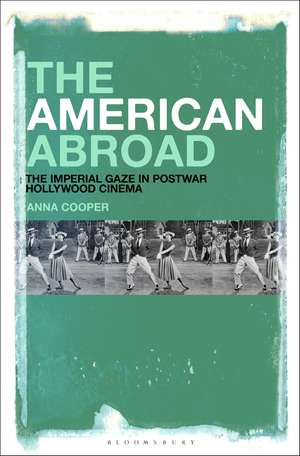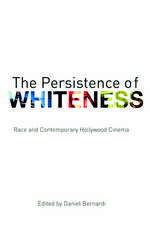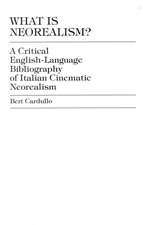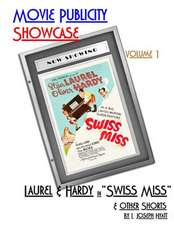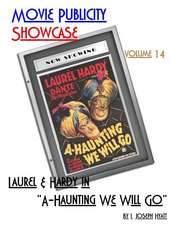The American Abroad: The Imperial Gaze in Postwar Hollywood Cinema
Autor Dr. Anna Cooperen Limba Engleză Paperback – 18 oct 2023
| Toate formatele și edițiile | Preț | Express |
|---|---|---|
| Paperback (1) | 190.50 lei 6-8 săpt. | |
| Bloomsbury Publishing – 18 oct 2023 | 190.50 lei 6-8 săpt. | |
| Hardback (1) | 509.60 lei 6-8 săpt. | |
| Bloomsbury Publishing – 20 apr 2022 | 509.60 lei 6-8 săpt. |
Preț: 190.50 lei
Preț vechi: 248.91 lei
-23% Nou
Puncte Express: 286
Preț estimativ în valută:
36.46€ • 37.77$ • 30.43£
36.46€ • 37.77$ • 30.43£
Carte tipărită la comandă
Livrare economică 22 martie-05 aprilie
Preluare comenzi: 021 569.72.76
Specificații
ISBN-13: 9781501391729
ISBN-10: 1501391720
Pagini: 216
Ilustrații: 30 bw illus
Dimensiuni: 152 x 229 x 25 mm
Greutate: 0.3 kg
Editura: Bloomsbury Publishing
Colecția Bloomsbury Academic
Locul publicării:New York, United States
ISBN-10: 1501391720
Pagini: 216
Ilustrații: 30 bw illus
Dimensiuni: 152 x 229 x 25 mm
Greutate: 0.3 kg
Editura: Bloomsbury Publishing
Colecția Bloomsbury Academic
Locul publicării:New York, United States
Caracteristici
Addresses one of the key (and still quite understudied) aspects of transnational cinema, ie. the question of travel, tourism and postcolonial gaze
Notă biografică
Anna Cooper is Associate Professor in the School of Theatre, Film, and Television, University of Arizona, USA. She completed her PhD at the University of Warwick and has worked at the universities of Hertfordshire, Sussex, and California (Santa Cruz). She co-edited Projecting the World: Representing the "Foreign" in Classical Hollywood (2017).
Cuprins
AcknowledgementsList of FiguresIntroduction: Cinema, Empire, and the "American Century" 1. The Sublime: Urban Ruins from Nazism to the Cold War2. The Ethnographic: Imperialist Nostalgia and the American Technological Gaze3. The Picturesque: Italian Landscape Views and the American Female Gaze4. Glamour: The Necropolitics of Women's Fashion, from the Bombshell to the PrincessConclusionBibliographyIndex
Recenzii
In this eloquent and erudite exploration of an imperial Hollywood that framed and edited images of Europe for domestic consumption, Anna Cooper forensically shows the reader how to follow an untrustworthy tour guide.
The American Abroad offers a detailed and complex view of American imperialism using the institution of Hollywood cinema for fostering cultural dominance over Europe. Anna Cooper foregrounds the figure of the tourist to unravel in nuanced detail just how Hollywood's utopian aesthetics "outrageously" depicts Europe as its Orientalist Other on screen. With rich textual analyses of a specific corpus of Post-War films set in Europe, The American Abroad forms an important contribution to the renewed interest in Transatlantic cinematic encounters.
The American Abroad addresses the complex ideological relationship between the U.S. and Europe through a lively and attentive analysis of postwar Hollywood cinema's visual strategies. By illuminating the ways that the "dream factory" imagined a Europe that exists primarily for the white traveler, Cooper's study contributes to a richer understanding of U.S. imperialism and its cinematic narratives.
The American Abroad offers a detailed and complex view of American imperialism using the institution of Hollywood cinema for fostering cultural dominance over Europe. Anna Cooper foregrounds the figure of the tourist to unravel in nuanced detail just how Hollywood's utopian aesthetics "outrageously" depicts Europe as its Orientalist Other on screen. With rich textual analyses of a specific corpus of Post-War films set in Europe, The American Abroad forms an important contribution to the renewed interest in Transatlantic cinematic encounters.
The American Abroad addresses the complex ideological relationship between the U.S. and Europe through a lively and attentive analysis of postwar Hollywood cinema's visual strategies. By illuminating the ways that the "dream factory" imagined a Europe that exists primarily for the white traveler, Cooper's study contributes to a richer understanding of U.S. imperialism and its cinematic narratives.
